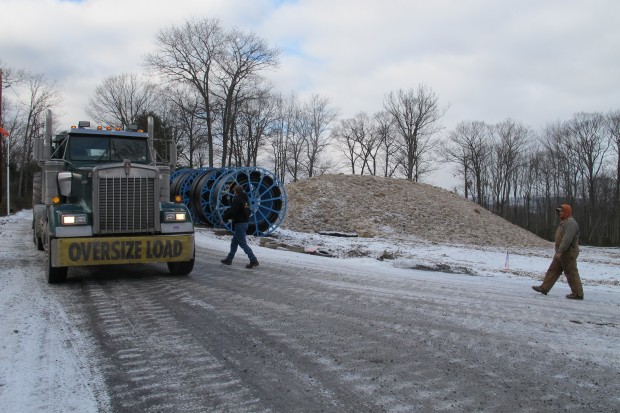Corbett budget proposal expands drilling in state parks and forests
-
Marie Cusick

Marie Cusick / StateImpact Pennsylvania
An oversize truck load of natural gas equipment moves slowly along an icy mountain road in the Tiadaghton state forest.
Governor Corbett is seeking to overturn a Rendell-era executive order that placed a moratorium on new gas leases in state parks and forests.
Today Corbett unveiled his $29.4 billion spending plan for the coming fiscal year. He says allowing new oil and gas leases could immediately generate $75 million in new revenue to the state, with substantial additional royalty revenue in the future.
Corbett did not directly mention the issue in his budget address to the legislature, but he touted the benefits the Marcellus Shale has brought to the state, noting that Pennsylvania is on track to become the second-largest producer of natural gas in the nation.
“Shale gas offers our country a chance at energy independence and greater economic security – and it’s part of the all-of-the-above strategy we’ve put in place,” Corbett said.
Non-impact drilling
Budget Secretary Charles Zogby called the proposal a restrictive approach to drilling. He says gas companies would not be allowed to construct new well pads. Instead, they could lease new underground mineral rights near existing drilling sites or through adjacent properties.
“We’re looking at an approach that makes no surface disturbance to the land,” says Zogby. “These are pads that are already out there. From a public standpoint they’re not going to see any activity that they otherwise might not.”
In a budget brief put out by Corbett’s office, the proposal called for allowing “non-impact drilling,” which was defined as, “limited drilling activity on commonwealth-owned land, where drilling can occur without the need for additional surface impacts.”
Zogby declined to answer a question about whether transporting approximately 4 million gallons of water per well to a site constitutes a surface impact. It’s not clear whether the measure will allow for new permits for gas-related infrastructure, like pipelines or compressor stations.
When asked by StateImpact Pennsylvania if this budget proposal will effectively overturn the Rendell-era moratorium on new leasing, Zogby said Corbett is planning on issuing his own order.
“I think you’ll see a new executive order issued at some point in the future by the governor,” he said.
Mixed reaction
Legislators were cautious in their responses to the proposal.
“I am obviously sensitive to the concern people have about drilling in the state forest and I’d like to see the details of his plan before I come to a final judgement,” said Senate Majority Leader Dominic Pileggi (R- Delaware).
Senator Gene Yaw (R- Bradford) chairs the senate Environmental Resources and Energy Committee. He said he hadn’t heard much about Corbett’s plan.
“If it’s non-impact, it’s something to look into,” he said. “But as far as I know, the moratorium placed in effect by Governor Rendell is still in effect.”
Senator John Yudichak (D- Carbon) the minority chair of the committee. He says he’s concerned about the idea, calling it a budget gimmick.
“Anytime you hear ‘non-impact drilling’ that certainly raises eyebrows and raises concerns,” he says.
The Marcellus Shale Coalition, a gas industry trade group, praised the budget proposal.
“This common sense, pro-growth budget reflects the clear fact that safe, tightly-regulated shale development — which occurs overwhelmingly on private land as well as on taxpayer-owned land — is a powerful economic engine,” said MSC spokesman Steve Forde in an email.
Meanwhile environmental groups condemned the idea of leasing more land.
“This will place more and more of the budget burden on the backs of public lands,” said PennFuture president Cindy Dunn in statement. “The governor reveals the short-sighted nature of his stewardship of our natural resources by trading more long-term harm to our state parks and forests in return for short-term economic gain.”
















